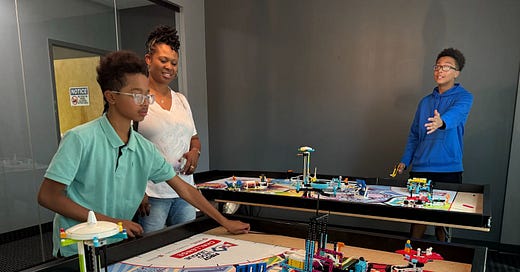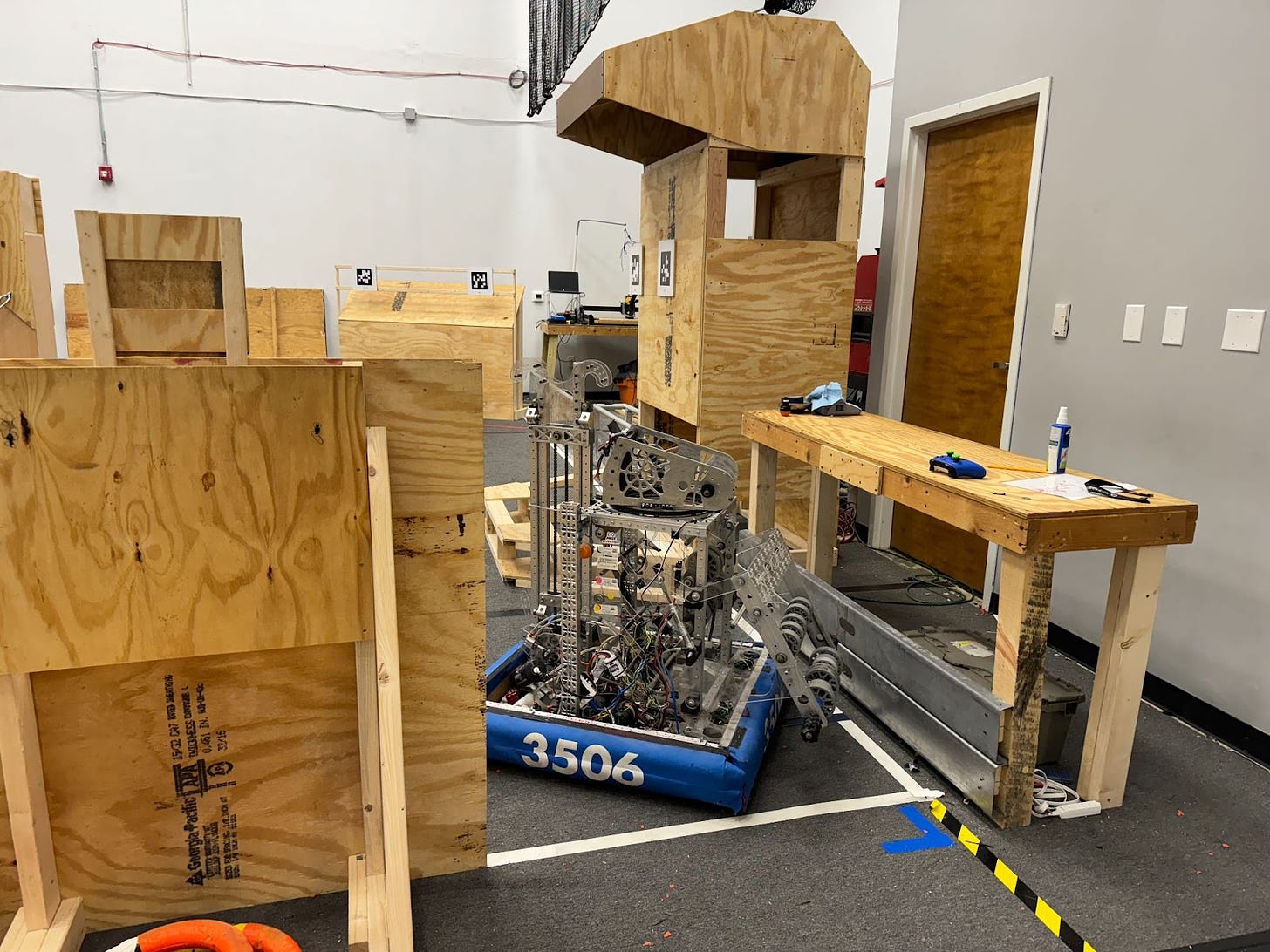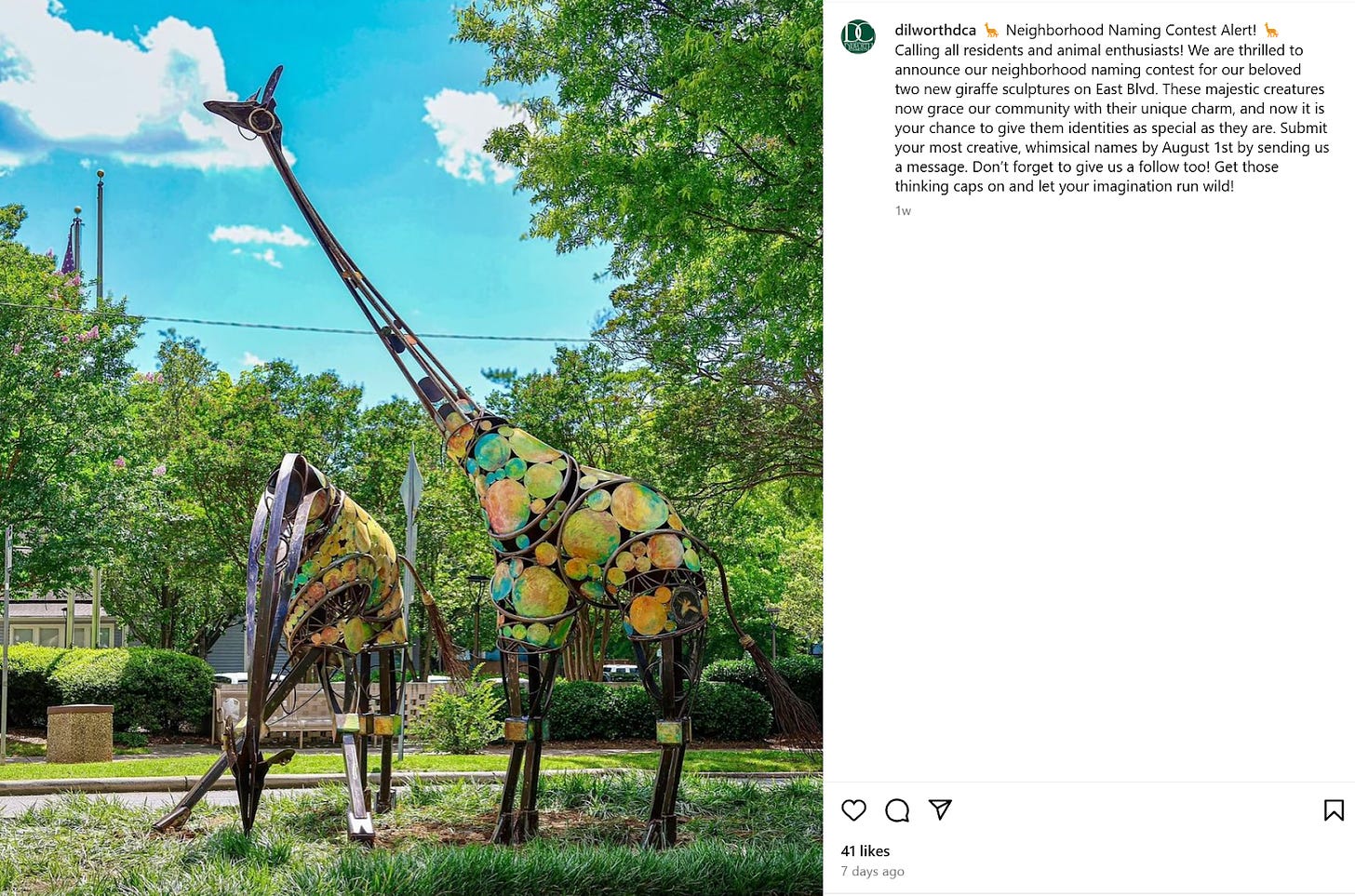Newsletter 7/29: Gears and growth at a robotics nonprofit
Plus: Council member blasts 'back room' deals on transit plan; Dilworth works to name giraffe sculpture; New skybridges at airport; Wells Fargo told to pay $22M; Cooper out of the running for VP?
Good morning! Today is Monday, July 29, 2024. You’re reading The Charlotte Ledger, an e-newsletter with local business-y news and insights for Charlotte, N.C.
Need to subscribe — or upgrade your Ledger e-newsletter subscription? Details here.
Today’s Charlotte Ledger is sponsored by T.R. Lawing Realty:
Can a summer camp inspire a robotics career? For a decade, Queen City Robotics Alliance has ignited kids’ interest in STEM through serious competition and after-school programs.
Queen City Robotics Alliance hosts a summer camp for rising fourth through eighth graders to teach them beginner coding techniques and build a robot out of Legos.
by Lindsey Banks
Up until a few weeks ago, Jonathan Lesko, a rising seventh grader at Kennedy Middle School, had never built and coded a robot. He was interested in learning, so his mother signed him up for a week-long day camp this summer with Queen City Robotics Alliance, a local nonprofit that serves as a hub for youth robotics programs and competition teams.
Over the course of the week, Lesko worked with a team of rising fourth through eighth graders, all of whom were beginner coders, to design and construct a robot out of Legos and program the robot to move and push around objects.
Jonathan, 12, caught on quickly earning himself the nickname “master builder.” His team spent more than five hours coding their robot to move around a loop through the hallways of QCRA’s new facility in Ayrsley called The Zone.
One week of robotics camp was all Jonathan needed to decide he’d like to keep coding and join a team during the school year.
“The master builder will return,” Jonathan said as his mother picked him up from the final day of camp.
STEM programs like robotics are on the rise both within school systems and as after-school activities nationwide. The U.S. Bureau of Labor Statistics estimates that science, technology, engineering and math jobs in the U.S. will rise nearly 11% by 2031 — more than two times faster than all other occupations.
That’s where programs like Queen City Robotics Alliance come in.
QCRA was founded in 2014 as an umbrella fundraising organization for competition teams and events with FIRST Robotics, an international nonprofit organization for youth robotics. QCRA’s goal is to bridge the gap of STEM learning for Charlotte-area students. The nonprofit offers scholarships for its programs in an effort to get more students from Title I schools into robotics.
When QCRA moved into its new facility almost a year ago, the nonprofit was able to expand its services and serve as a meeting space and resource for camp, after-school programs and competition teams. Before The Zone, QCRA relied on schools to host programs.
Serious competition: QCRA’s summer camps are designed to give students a taste of robotics to determine if they want to commit to a competition team during the school year. There are nearly two dozen local middle school and high school teams across Charlotte, with the average high school team size of about 30 students. (One of the largest teams in the area, called Team YETI, has nearly 70 students on the team.) [Edited on 7/29/24 at 11:45 a.m. to correct the YETI team name to be all caps.]
The time commitment and structure of a FIRST team is similar to that of a sports team, said Robbie Hoyler, a mechanical mentor for the YETI competition team. Hoyler competed on his high school’s team in Hillsborough in the early 2000s.
Students log about 20 to 30 hours of work every week either after school or on the weekends during the competition season, which runs from January through April for the high school level, said student and YETI member Patrick Kilcoyne.
Kilcoyne, a rising senior at Ardrey Kell High, works on the YETI team’s mechanical side. He told The Ledger he plans to study mechanical engineering in college.
This year, the competition season has an ocean exploration theme, and teams across the world have roughly six weeks starting in January to build their robots before the league’s first competition, typically in March. The final competition of the season, the world championship, is typically held in late April.
The high school students’ parents usually volunteer to help build the practice field at QCRA while students begin designing and planning their robot. QCRA’s practice field is the only one of its kind in North Carolina, Hoyler said. The next closest model is in Atlanta.
Parent volunteers construct the practice field inside QCRA’s new facility for the competition season while students begin designing and building their robot.
Then, students spend just about every minute of free time to get their robot ready to compete. They meet after school and on the weekends perfecting their design at The Zone in Ayrsley.
When it’s time for competitions — which are often outside of Charlotte — teams use their robots to compete against each other to complete a specific task, like moving objects such as traffic cones to score points.
More than robotics: Beyond gaining skills programming robots, students also pick up skills in marketing and social media, as well as drumming up corporate sponsors to fund the team’s work. The average robot costs about $10,000 to make, so each team must fundraise to buy materials and pay for competition travel.
Students on the YETI team who wish to travel to competitions must also complete 100 hours of volunteer work in the community. Some students, like Kilcoyne, volunteer at the QCRA summer camp to log hours.
Competitions are not all about having the best robot, Hoyler said. YETI received the prestigious FIRST Impact Award at the state championship this year because of the team’s volunteer work in the community.
And not only are students learning valuable STEM and leadership skills and getting exposure to potential career paths, but they are building a community that spans the globe.
“You’re a part of something that’s much bigger than you,” Kilcoyne said, “and you’re helping spread that around.”
Lindsey Banks is a staff reporter for The Ledger: lindsey@cltledger.com
Today’s supporting sponsor is By George Communications, an award-winning public relations firm. We love shaping stories and helping our clients gain coverage in local and national news outlets. Telling your story isn’t a “nice to have.” It's essential business strategy. What are you waiting for?
Council member says push for transit has been marked by ‘shady deals’ in ‘back rooms’; accuses city manager of lying
Charlotte City Council member Tariq Bokhari is publicly accusing City Manager Marcus Jones of telling a “bold-faced lie” about the city’s efforts to win approval for a sales tax increase that would pay for transit.
In a Facebook post on Thursday, Bokhari also said the process has been marred by “back rooms” and “shady deals.”
The objections from Bokhari, a Republican who represents part of south Charlotte, stem from the city’s efforts to advance its stalled plan for increased transit and transportation spending. The city has been working behind the scenes for months to build a consensus with Mecklenburg’s towns and the county government on legislation to present to the General Assembly that would allow a referendum on raising the sales tax by 1 percentage point, with the proceeds going to a newly created government panel that could spend the money on rail, roads and other projects.
Bokhari wrote that Jones told him earlier this year that some of the details would be worked out later, with the blessing of elected officials — but that now he and other elected officials were being kept in the dark as the details are hashed out.
Referring to a private meeting last week, Bokhari wrote: “I called [Jones] out on his bad faith approach and gave him an ultimatum: allow for me to work with my colleagues, towns, General Assembly and business community to fix this governance model AND support our officers’ requests for outer carrier vests… OR… I will fight against this shady sales tax play with everything I can muster.”
Bokhari also posted slides that he said were from the private meeting that show the proposal will call for a transit authority with 27 members — 12 appointed by Charlotte, 12 from the county (including one each from the six towns) and three from the state government. Those details had not been previously shared publicly.
Bokhari is known as one of the most outspoken and fiery members of the 11-member City Council. He is one of just two Republicans, but Republicans could have outsized influence on the transit question because they are more likely to have the ear of the Republican leaders of the General Assembly.
Other elected officials have bristled as Jones has told them details about the plan. Matthews Mayor John Higdon said in May that he thought that Matthews was “getting the shaft in this deal,” because its proposed cap on rail funding would likely exclude plans to build the Silver Line light rail to Matthews.
A city spokesman didn’t return a request for comment on Sunday.
Another council member, though, stuck up for Jones in a reply to Bokhari’s post.
Council member Malcolm Graham wrote: “We have one [of] the best city [managers] in the nation, and he’s not a [liar]. I find him to be an honest broker. Let’s focus on the policy.”
Related article:
A name game in Dilworth, as giraffe sculptures return
Residents of the Dilworth neighborhood are celebrating the return of two lifesized metal giraffe sculptures to East Boulevard with a contest to name them.
The sculptures, created by metal artist Ben Parrish and commissioned by Charlotte architect and developer David Furman, have been roaming since 2021, when they were evicted from their original spot on Lyndhurst Avenue and East Boulevard by a tenant who wished to put a sign on the spot where they stood.
They were moved to Wilmore Park in South End for a brief period before the county’s park and recreation department asked that they be moved. Earlier this summer, they were reinstalled in Dilworth after the neighborhood association succeeded in getting an easement from the city to put them in the East Boulevard median, a stone’s throw from their original location. (Queen City Nerve published a nice piece last month about the giraffes’ winding tale.)
Now, the neighborhood association is asking the public for name suggestions “to give them identities as special as they are.”
(You can chime in on the association’s Facebook or Instagram pages.)
Some of the suggestions so far: Fred and Wilma; Erma and Everett on East, and Latta and Dilly/Dil. —CB
New at the airport: You can cross that (sky)bridge when you get there
NEW AIRPORT SKYBRIDGES TO HELP THE FLOW OF TRAFFIC? Charlotte’s airport this week plans to unveil two new skybridges above the departures (upper) level that will link the hourly deck and rental car area to the lobby. The bridges could help alleviate traffic congestion at the arrivals (lower) level by providing an alternate way to get to the terminal besides walking in front of cars. The airport says the bridges are “streamlined pathways that bypass traffic and enhance passenger convenience.” The bridges weren’t open Sunday, but they appear ready to go, with new signs in place.
📫 Reader mailbag: How much do you really save with an electric vehicle?
Ledger readers had a lot of thoughts about our piece last week examining the costs of electric vehicles. Charlotte lawyer Marc Gustafson shared his experience with a year of EV ownership — and broke down how his costs compared with owning a gas vehicle.
Some of the comments:
“While it does sound enticing to think that it only cost him $34 plus a gallon of windshield washer solvent in annual maintenance costs for the first year, the true charging costs are much higher. If my employer reimburses me for the gas and mileage for when I use my personal vehicle for company business, do I calculate that into my annual operating costs? Isn't that akin to free charging of an EV? I am not against EVs. They make sense for urban use and short commutes. The added burden to our electrical grid and amount of energy to produce the batteries is an unspoken fact that is often overlooked.”
“I also have an EV, but I don’t think it is appropriate to frame your operating costs with free charging at work. You should tell your readers what the cost will be if they use home charging ($0.137 per kWh on Duke Power) or DC fast charging ($0.39 per kWh) or a mix of both. There will still be savings vs. gas, but costs will be much more than your analysis. You also pay a higher N.C. annual registration fee of $180 to own an EV to make up for no payment of fuel tax when charging. Put this all together, and the savings vs. gas for an efficient vehicle will shrink.”
“Marc Gustafson does not point out that the $7,500 price break is due to a federal tax incentive that encourages affluent people such as him to buy a second car. Nor does he realize the near zero cost to him of electricity to recharge is not free, it is paid by someone else. He has every right to take advantage of these policies but he should also be aware that this is called ‘rent seeking’ and is not something to be proud of.”
➡️ You can read Marc’s article here, or listen to a Charlotte Ledger Podcast episode (🎧) on the topic of electric vehicles.
You might be interested in these Charlotte events
Events submitted by readers to The Ledger’s events board:
TUESDAY: “Moonlight” movie and discussion, 7 p.m., Independent Picture House, 4237 Raleigh St. “The Critic’s Eye” film series continues with “Moonlight,” a tender and heartbreaking story of a young man’s struggle to find himself. Then stick around for a discussion with film critic Lawrence Toppman moderated by CXN Advisory’s Tim Whitmire. $8.45.
THURSDAY: Connect After 5, 5-7 p.m., Juniper Grill Ballantyne, 15235 John J. Delaney Drive Suite P. Join the Charlotte Area Chamber of Commerce for an engaging evening of networking and connection. This mixer is the perfect opportunity for professionals across various industries to come together, share insights and forge new business relationships. Free for members; $25 for non-members.
➡️ List your event on the Ledger events board.
In brief:
Disability accommodation verdict against Wells: A Charlotte jury ordered Wells Fargo to pay $22M to a former employee who alleged the bank failed to accommodate his disability and laid him off when it ordered workers back to the office after Covid. The managing director for West Coast asset-backed finance sales said the bank refused to work with him to accommodate his need to go to the bathroom regularly because of nerve damage to his colon and bladder sustained in a 1990 accident. He said he was a top performer with strong performance reviews but was told he was let go because of “cost cutting.” (Law 360, subscriber-only)
Cooper said to be off short list for VP: Bloomberg News, citing unnamed people familiar with the process, says Vice President Kamala Harris has a short list of three men for her vice presidential pick, and none of the three is N.C. Gov. Roy Cooper. The news service says the three are U.S. Sen. Mark Kelly of Arizona, Pennsylvania Gov. Josh Shapiro and Minnesota Gov. Tim Walz. (Bloomberg News, subscriber-only)
Sycamore to add taproom: Sycamore Brewing, Charlotte’s largest brewery, says it plans to add a second taproom in 2025, though the company’s president said the company hasn’t settled on a location. (Biz Journal, subscriber-only)
Soccer game leads to hotel sales record: Mecklenburg County hotels set a new occupancy record the night of the Colombia-Uruguay Copa America semifinal soccer game at Bank of America Stadium. Hoteliers sold 28,873 rooms on July 10, surpassing the record set in 2021 on the night of the Georgia-Clemson football game. (Biz Journal, subscriber-only)
Tax bills incoming: Mecklenburg County is mailing property tax bills this week. They are due Sept. 1 and must be paid by Jan. 6 to avoid interest. (WFAE)
Golf cart death: A 15-year-old girl was killed in Rock Hill when the golf cart she was riding in collided with a Honda CRV. (WSOC)
Showmars closing uptown spot: Showmars plans to close its location in the Charlotte-Mecklenburg Government Center uptown. (WSOC)
Need to sign up for this e-newsletter? We offer a free version, as well as paid memberships for full access to all 4 of our local newsletters:
➡️ Learn more about The Charlotte Ledger
The Charlotte Ledger is a locally owned media company that delivers smart and essential news through e-newsletters and on a website. We strive for fairness and accuracy and will correct all known errors. The content reflects the independent editorial judgment of The Charlotte Ledger. Any advertising, paid marketing, or sponsored content will be clearly labeled.
Like what we are doing? Feel free to forward this along and to tell a friend.
Sponsorship information/customer service: email support@cltledger.com.
Executive editor: Tony Mecia; Managing editor: Cristina Bolling; Staff writer: Lindsey Banks; Business manager: Brie Chrisman








